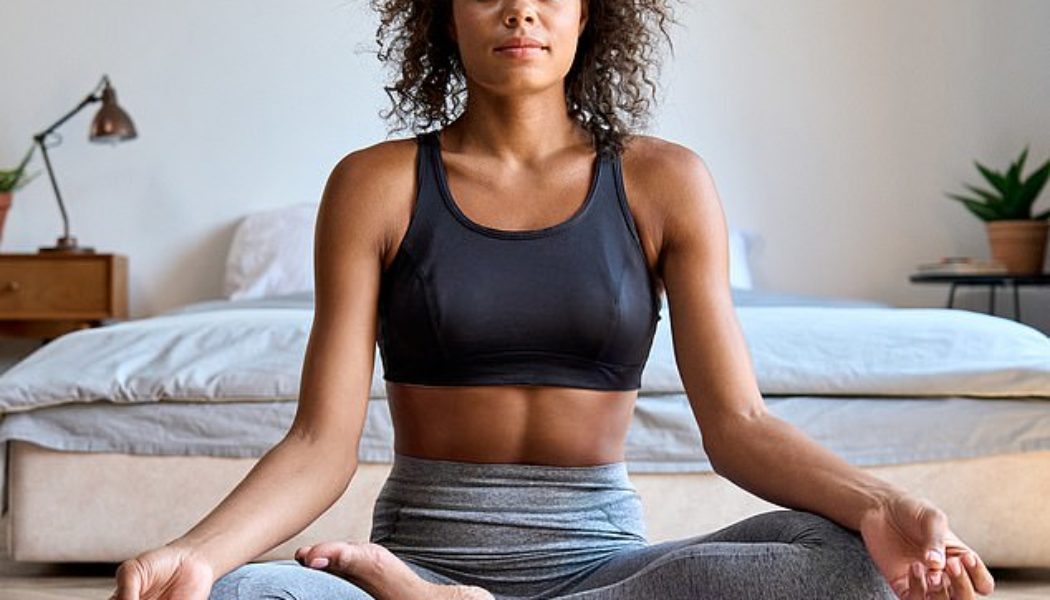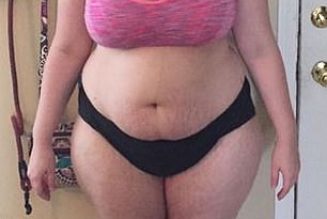Is the pursuit of wellness making you…UNWELL? Experts reveal the 4 fitness trends which could be damaging your health
Over the past few years wellness trends have grown in popularity – from yoga and meditation to gut-friendly foods.
And while being invested in looking after our physical and mental health is a good thing, experts have questioned if the fixation and constant bombardment on self-improvement actually making us happy.
Life coach and NLP practitioner Rob Brennan told FEMAIL: ‘The trend of wanting more, wanting to be happier, wanting to look perfect and to have the perfect life, is ironically creating deep rooted unhappiness and discontent.’
And from cutting out food groups to eat ‘cleanly’ to tucking into protein bars, experts said there are a number of different ways following wellness trends could be damaging your body.
Here FEMAIL reveals the four trends not to follow…

1. ‘POSITIVE MENTAL ATTITUDE’…CAN BE TOXIC
According to Rob, a positivity overload, as in pretending everything is ok when it isn’t and trying to ignore life’s ups and downs, can actually have a negative impact on our mental healthy.
This the expert coins as ‘toxic positivity’, which he said has come from ‘hijacking of good mental health advice and suggestions by the uninformed influencers’ as well as magazines, the media and celebrities.
While ‘good vibes only please’ or ‘I choose to surround myself with positive people only as I don’t want to be dragged down’ sound like positive principles, they force us to ignore sadness or pain because it’s unsettling.
He uses the example of telling people it’s okay not to be okay while wearing a new ‘good vibes only’ hoody to illustrate how this can send people mixed messages and put people off discussing difficult matters.
He said: ‘Life is not all good vibes at all, it’s hard, complicated, tiring and has ups and downs all the way from start to finish; pretending it’s all good vibes and silencing ourselves and others with toxic positivity leads to unhappiness, anxiety and pain.
‘I think I’ll get a hoody made “good vibes only” on the front then “toxic positivity – making people feed bad for feeling sad” on the back, I think it’ll sell well once people get it.’
No one is positive all the time it’s not normal to be so, everyone has trials and struggles and this should be normalised.
The life coach explained that everyone struggles sometimes but when people feel on the outside or not normal because they are sad, they don’t necessarily get the help that they need.
Rob said: ‘Whilst society and social media remains riddled with toxic positivity, the clear message to those who aren’t okay is that it is very much not okay and that no one wants to hear about it if you aren’t.’
2. INSTA-INSPO… ISN’T REALISTIC
Unpacking wellness further, Rob described how many people can feel inadequate when confronted with images of what ‘wellness’ and ‘happiness’ looks like.
He said: ‘These images are simply unattainable to the vast majority and they are created in entirely false situations where reality is a distant consideration.’
‘It can take hours to create the right the shot, whether it be the perfect plate of food or position on a yoga mat, when in reality some people may not have the time to engage in a full yoga session first thing or the money to buy in the ‘best health foods’.
What people don’t see is the deleted shots that weren’t right or what they look like unfiltered, or what they eat 90 per cent of the time.
Rob wants to remind people that wellness ‘is not associated with actual happiness and health but with the perception of it, and these two things are very different.’
He warns that sharing pictures of ‘healthy lifestyle’, whether it be food, exercise, or taking time for yourself are heading towards toxic territory because it isn’t the norm and often unattainable for most people juggling busy lifestyles, and so they may only ever feel sad and inadequate when they try to incorporate wellness into their lifestyle.
It’s not just the pressure of leading an active, healthy lifestyle that can be detrimental to overall wellness but nutrition can also have a negative impact.
3. ‘CLEAN EATING’…COULD BE DEPRIVING YOUR BODY OF NUTRIENTS
Jordan Storey, a nutritionist and personal trainer, explained: ‘Wellness trend “clean eating” – bland chicken and broccoli type training diet focusing on food as fuel can shift our perception of eating as one of life’s pleasures towards seeing it as a chore or with guilt.’
Jordan, who was a former bodybuilding, explained how he has trailed many diets within his 15 years of experience.
He explained: ‘People tend to fall out of love with food easily and even create a negative feeling towards the food they eat, which can impact their mental wellbeing.’
Jordan revealed that people may be missing out on the vital vitamins that their bodies need if they are following wellness trends.
In addition, by eating what you think you are supposed to eat takes the fun out of food.
He said: ‘My quote “Add love back into your food” simply meaning you should enjoy the foods you are cooking and eating, and not only will your body thank you for it but your whole mindset will change too.’
4. HIGH PROTEIN SNACKS…ARE PACKED FULL OF SUGAR
In addition, wellness food trends such as ‘high protein snacks’ are all over social media.
These can include high protein yoghurts, puddings and drinks claiming to be packed with protein and low calorie.
However Jordan described how they are usually high in sugar and so will spike insulin levels.
In addition, the protein content they use doesn’t always come from a full complete protein source such as milk protein.
He said: ‘Can I also just note once you spike your insulin levels they do have to come back down which then they will crash leaving you wanting even more sugar to help stable your blood sugars.
‘I am not saying to avoid these totally as that wouldn’t be a healthy lifestyle.
‘I do believe in the 80/20 lifestyle rule…however if you do crave something sweet you might as well just enjoy your favourite chocolate bar than go for these.
‘The high protein is definitely used in the title to make you buy these products.
‘A burger from McDonalds is much higher in protein than these puddings but they do not claim its a high protein burger.’









